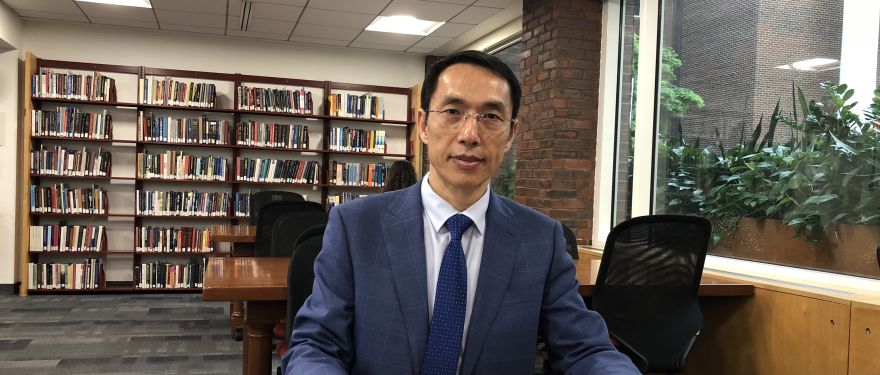Dr. Baozhong Su now is an Asian Fellow at Ash Center for Demo Governance and Innovation, Harvard Kennedy School. As a professor, he comes from the College of Economics and Management, China Agricultural University (CAU) in Beijing, P.R. China, where he teaches Leadership and Public Management. He cross-registered the course of Leadership Execution and Action Planning (LEAP) for MBA students at Harvard Business School out of curiosity because he has great interest in the Harvard case method and its related knowledge. Dr. Su holds a Ph.D. in management from the CAU. He received his master’s degree in management from Nanjing University and his Bachelor’s degree in literature from University of International Business and Economics.
As a Visiting Scholar at Harvard University, I cross-registered to take the course of Leadership Execution and Action Planning (LEAP) offered at HBS for MBA students last semester. I was familiar with the theory of leadership, and I also had many years of teaching experience on this subject, but finding an effective way of helping students learn and improve the skills of leadership in the class were still quite tough for me.
LEAP is one of the dozens of courses related to leadership offered by HBS, based on the idea that "we challenge you to think differently." It is designed so that students can achieve the transition from the understanding of leadership in class to the skill of problem-solving in the real world. I recognized many ways of teaching to realize the transition before the course started, yet I still looked forward to seeing how HBS Professor David G. Fubini would bring this to life.
First, Professor Fubini impressed me with his grace, intelligence, and honesty. I witnessed him steering the class well with his many years of experience in teaching and executive management. No matter how complex the situations of leadership we were discussing through the cases, he could narrate clearly. He also had a good sense of humor, which made serious classroom discussions easy and enjoyable. More to the point, while asking students to share their experience of failure, he could do the same with the class.
There were more than 60 people in the LEAP class representing different ethnicities and nationalities. It was clear that every student needed to read plenty of materials a week before the class. Not only that, all of the case materials we read were about world-renowned companies such as American Airlines, Big Apple Circus and Faber-Castell, etc.; the questions we needed to think about were complex and intractable, such as enterprise merger and acquisition, crisis leadership and decision making and so on.
Nevertheless, the real challenges went well beyond these.
Throughout the process of case teaching, Professor Fubini put the students in the position of the case protagonist, and he acted as a facilitator. I realized that it was hard for all students no matter their background to express their thoughts based on the role-plays in the class. However, because his opening questions aimed high and the basic process for questions was clear and well planned, the class went well. In particular, the passion he showed in the class obtained the enthusiasm of the students.
Professor Fubini did not make comments on what the students discussed except for the necessary instruction. Instead, he took careful notes of their valuable comments by category on an interactive blackboard. I knew that the content on the board not only meant a summary of the class but also stood for the contributions of the students who were involved. I could feel a strong sense of achievement in the classroom
Yet, it was not the end of the LEAP class. Followed by face-to-face dialogue between students and guest speakers, Professor Fubini invited the real protagonists of the case to the class. The guest speakers shared their own experiences with the class under the background of the case and answered questions raised by students. The protagonists enlightened responses sometimes challenged the students as the guest speakers and students held different positions and information, making their understanding, choices, and actions varied; this forced the students to reflect and renew their solutions to the case dilemma. At that moment, Professor Fubini reminded students that there is not an absolutely right answer to solve a problem, and they should find one properly to the specific context.
Several classmates remarked: "It is quite different from the course of leadership that I learned in the first grade. This course has inspired me to face problems and think about the solutions. I like it very much!" "In this class, I have learned a lot during the discussion with my classmates." "It is a challenge for international students, and of course, for all of us. It takes courage to speak out in class. However, I know that the breakthrough needed is what I want. So, I really enjoy this course."
Although the class ended a month ago, I am still thinking about it. To me, it was a process of constant challenge, not only for students but for the facilitator. Obviously, Professor Fubini offered a good combination of the leadership theory and practice with his systematic case teaching style. And, while encouraging students to make a breakthrough in various challenges, he emphasized that students should be themselves. This, too, is an art of teaching that I appreciate so much.

